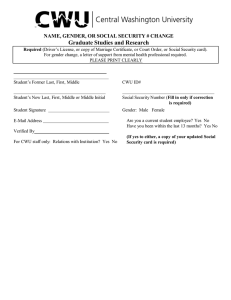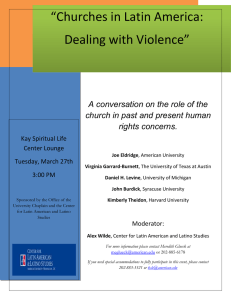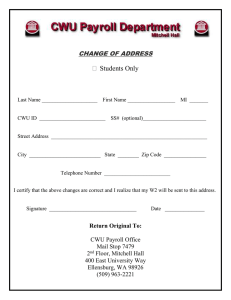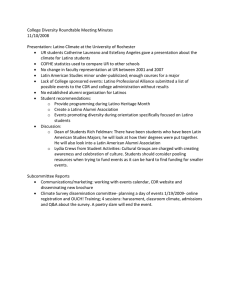Central Washington University Latino and Latin American Studies Program Review
advertisement
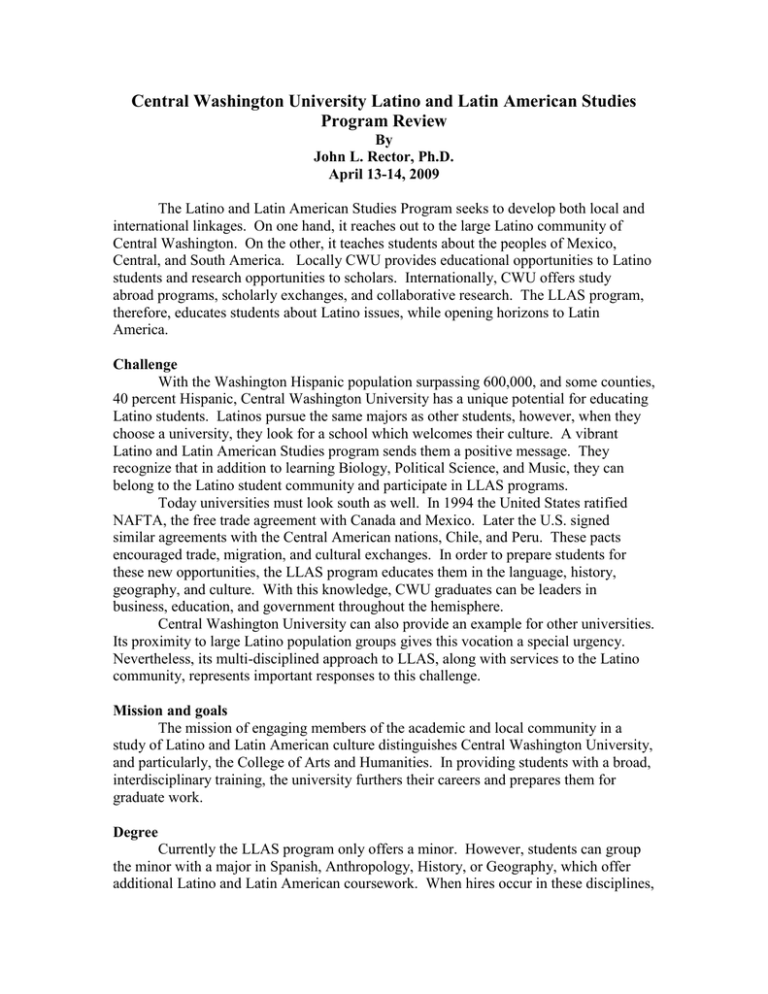
Central Washington University Latino and Latin American Studies Program Review By John L. Rector, Ph.D. April 13-14, 2009 The Latino and Latin American Studies Program seeks to develop both local and international linkages. On one hand, it reaches out to the large Latino community of Central Washington. On the other, it teaches students about the peoples of Mexico, Central, and South America. Locally CWU provides educational opportunities to Latino students and research opportunities to scholars. Internationally, CWU offers study abroad programs, scholarly exchanges, and collaborative research. The LLAS program, therefore, educates students about Latino issues, while opening horizons to Latin America. Challenge With the Washington Hispanic population surpassing 600,000, and some counties, 40 percent Hispanic, Central Washington University has a unique potential for educating Latino students. Latinos pursue the same majors as other students, however, when they choose a university, they look for a school which welcomes their culture. A vibrant Latino and Latin American Studies program sends them a positive message. They recognize that in addition to learning Biology, Political Science, and Music, they can belong to the Latino student community and participate in LLAS programs. Today universities must look south as well. In 1994 the United States ratified NAFTA, the free trade agreement with Canada and Mexico. Later the U.S. signed similar agreements with the Central American nations, Chile, and Peru. These pacts encouraged trade, migration, and cultural exchanges. In order to prepare students for these new opportunities, the LLAS program educates them in the language, history, geography, and culture. With this knowledge, CWU graduates can be leaders in business, education, and government throughout the hemisphere. Central Washington University can also provide an example for other universities. Its proximity to large Latino population groups gives this vocation a special urgency. Nevertheless, its multi-disciplined approach to LLAS, along with services to the Latino community, represents important responses to this challenge. Mission and goals The mission of engaging members of the academic and local community in a study of Latino and Latin American culture distinguishes Central Washington University, and particularly, the College of Arts and Humanities. In providing students with a broad, interdisciplinary training, the university furthers their careers and prepares them for graduate work. Degree Currently the LLAS program only offers a minor. However, students can group the minor with a major in Spanish, Anthropology, History, or Geography, which offer additional Latino and Latin American coursework. When hires occur in these disciplines, the addition of faculty with Latin American specializations will benefit both the discipline and LLAS. In the future the university should seriously consider offering a LLAS major, but to do so, two steps are needed. Additional tenure track hires are required, as well as a fulltime LLAS director. Program Director and Faculty Professor Michael Ervin provides important leadership to the LLAS program. He is eager receive grants at both local and national level to support the program. His leadership gives direction to the interdisciplinary faculty. With encouragement he will help this program grow. Currently the program faculty consists of three professors each, in Spanish and Anthropology, two each, in History and Geography, and one each, in Political Science, English, and Sociology. In addition there are seven affiliate faculty, two in Biology and one each in Spanish, Art, English, and Communications. Most of these talented professors did their dissertation and post-doctoral research in a Latin American subject area. Their published works have gained national recognition. Due to departmental demands, however, they cannot offer LLAS courses as often as they would like. Were one or more faculty hired exclusively in LLAS, this would solve the course problem, while giving valuable momentum to the program. Curriculum An interdisciplinary course, “An Introduction to Latino and Latin American Studies,” as well as a year of a Romance Language, are required of all students seeking an LLAS minor. Students take five additional upper division courses from three different disciplines to complete the minor. Eight different departments offer courses on a wide variety of topics. The participating LLAS faculty members, however, have many departmental teaching obligations and therefore cannot offer some courses with regularity. The hiring of Dr. Gilberto Garcia, who teaches both the introductory course, as well as two upper division courses, partially helped resolve this problem. Currently CWU has no faculty member who specializes in Brazil. A tenure track faculty member whose research area is Brazil would greatly strengthen the program. Academic Resources The LLAS minor program is difficult to find on the CWU webpage. Other outreach programs for Latino students are almost invisible on the web. These programs and resources need to be more accessible through electronic means. At Central Washington, students have an excellent library environment and a variety of resources. The library collection’s strength is its databases. Its reference and monograph holdings are adequate, but a Spanish area collection librarian would help fill important gaps that are needed by students and faculty alike. With inadequate basic materials in their area of expertise, younger faculty members become demoralized. An area specialist, however, knows how to address their needs. Students Both Latino and Anglo students are equally interested in the minor program, but their concerns are different. The Latinos look at the program to reaffirm their identity and create a campus community. They are eager to study courses which give them a better understanding of their complex culture with both Latin and American roots. Some interact with students of their same background in Casa Latina, but they would appreciate a gathering place to reinforce a Latino campus community. The Anglo students’ interest comes from the outside, looking in. They want to learn Spanish, study abroad, and live Latin American culture. Some enjoy living with Latino students in Casa Latina. Students should be encouraged to study abroad and participate in community outreach programs. More support for both alternatives is needed. Service A dedicated group of faculty and staff writes grants and recruits Latino students to CWU. The Department of Education awarded their efforts with a GEAR UP grant of $7,000,000 over a 5-year period. Some of this funding goes to the Bridges program, which employs 50 CWU students who develop programs for high school Latinos. Because the GEAR UP grant will soon expire, this unique CWU tie to area high school students is in jeopardy. Some faculty as well as service organizations have an excellent record of working with the community. The personnel in LEAP, CAMP, and Bridges recruit and advise Latino students. Their efforts have increased Latino enrollment to approximately 8 percent of the student population. Some CWU leaders envision tripling this number in the next few years. By strengthening current outreach programs, which mentor Latino high school students, this goal can be achieved. Casa Latina and MEChA encourage Latino students to live and study together, while addressing their common concerns. The faculty members who support these programs show them the university’s commitment. Central Washington University also supports APOYO, an organization which distributes both food and clothing to the poor. Philip Garrison’s commitment to this community service keeps it going. Few universities can equal APOYO’s and CWU’s support of the poor. This important program could be expanded through student service learning projects. Community Outreach Latino graduates from CWU represent the best connection that the university has with the communities in the state. There is a need for a Latino alumni group to recruit prospective students, communicate CWU programs to them, and campaign for resources for the university. Another opportunity for outreach is the Spanish language radio station, Radio Cadena, located in Yakima. Wenatchee entrepreneur, Jesus Hernandez, runs a leadership academy, which likewise has extensive contacts in Central Washington. International Outreach The Secretariat of Culture of Michoacán, Mexico would like to develop an exchange program with CWU. With more than half of Latino students having Michoacán ancestry, this agreement offers potential for study and research. Faculty-led programs to Veracruz and Oaxaca, Mexico have provided students with a valuable insight to Mexican culture. Study abroad consortia with which CWU is affiliated offer programs in Mexico and Argentina. Additionally CWU runs its own highly successful program in Valdivia, Chile. Numerous faculty members have taught on these programs and acquired materials they later use in their courses at CWU. Recommendations: The interdisciplinary group of faculty members, who form the Latino and Latin American Studies program, has created a positive learning environment for Latino and traditional students alike at Central Washington University. Nevertheless, to strengthen the LLAS program, the university should consider the observations included in this review as well as initiatives outlined below. 1. Visibility Prospective students need to know about the LLAS program. What they see on the web or in the media influences their decision to attend CWU. As mentioned earlier, greater visibility on the university webpage is needed. The use of other sources such as the Latino radio and television stations, outreach programs, and the Latino alumni would also be effective. 2. Grants and Services In 2007 the LLAS program submitted an NEH Challenge Grant proposal. Although CWU was not awarded a grant, the NEH sent useful suggestions which can help to rework and resubmit the proposal. The funding for GEAR UP is about to end, which will put a number of programs in jeopardy. The university should try to renew this grant and seek new grants for student services and academic programs. 3. Staffing The LLAS faculty has many departmental obligations and therefore it is unable to offer the program’s courses with regularity. A fulltime director of LLAS with an additional faculty who specializes in Brazil would help to remedy this problem. The lack of area specialist librarian in Spanish, Latin America, and Latino culture should also be resolved. 4. Community CWU Latino students voice a concern that other Washington universities are more attractive to Latinos because of their Chicano or Multicultural centers. They also object to a lack of ethnic diversity among the faculty and occasional insensitive ethnic remarks. Creating a Latino center and hiring additional LLAS faculty members would help address these concerns. The community is also under stress due to the national debate on immigration and amnesty. Central Washington’s Latinos feel threatened, which has serious consequences for the state’s economy. LLAS faculty and students can contribute positive ideas to this debate by emphasizing the economic, social, and cultural contributions of Latinos. The people of the Pacific Northwest deserve a comprehensive understanding of these issues, not one-sided perspectives. 5. International Links The LLAS program already has valuable international linkages through study abroad programs and faculty research and publications. These linkages need promotion and funding to grow. Likewise, new opportunities, such as the agreement presented by the Secretariat of Culture of Michoacán, should promote student and faculty exchanges. 6. Center The LLAS faculty and the students need a place to meet to order to plan both curriculum and activities. The center will also give visibility to LLAS when recruiting Latino students to CWU. 7. Enrollment Given the current economic crisis and its impact on higher education, Latinos represent an important student to grow enrollments at CWU. The LLAS program is a selling point for attracting these students.
